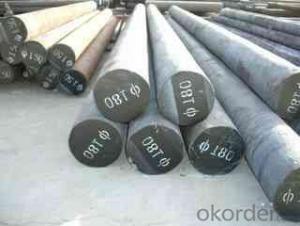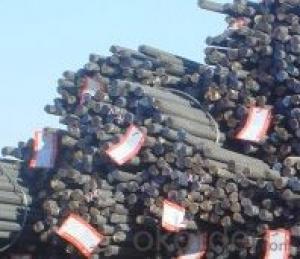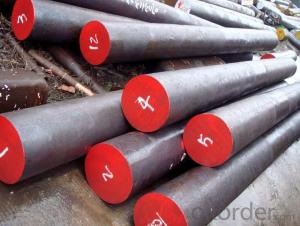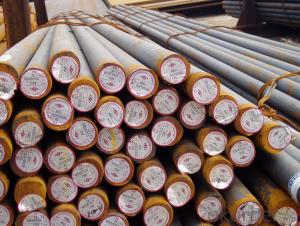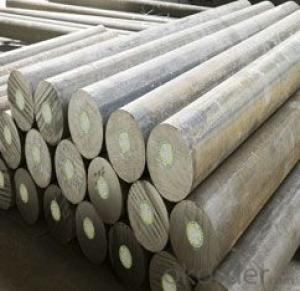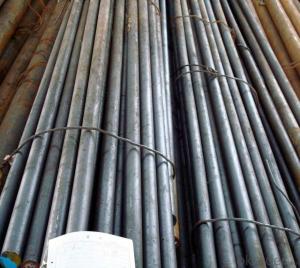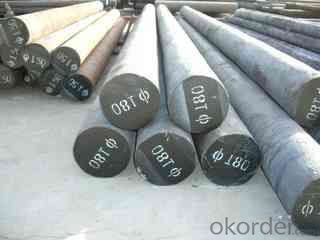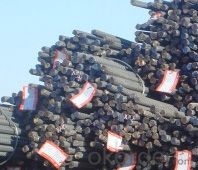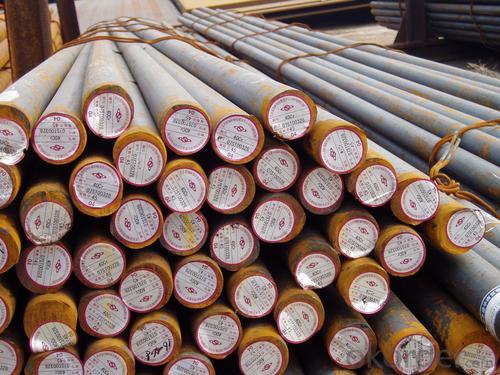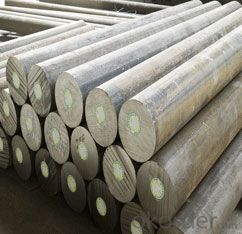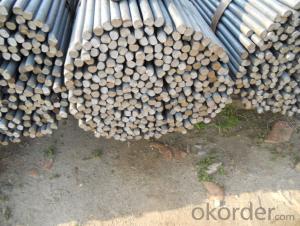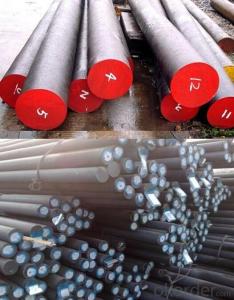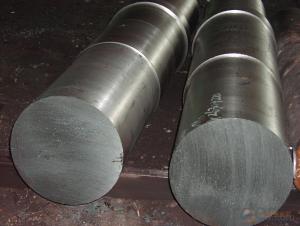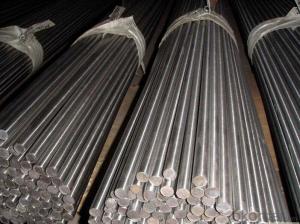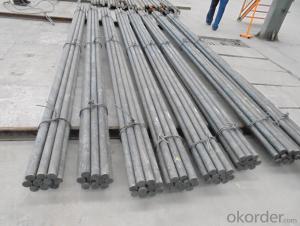JIS /GB/DIN alloy round steel bar 100*100
- Loading Port:
- Tianjin
- Payment Terms:
- TT OR LC
- Min Order Qty:
- 200 m.t.
- Supply Capability:
- 10000 m.t./month
OKorder Service Pledge
OKorder Financial Service
You Might Also Like
Product Description:
Specifications of American Standard Round Bar
1. Grade: ASTM A36; AISI 1006-1025
2. Sizes: Diameter: 6mm-150mm; Length: 6m, 9m, 12m or as customer’s request
3. Tolerance: Within ±5% for weight; ±2mm for diameter
4. Type: Mild steel; Low carbon steel
5. Shape: Round bar, solid bar of steel with circular section
6. Technique: Hot rolled or cold drawn
7. Mass: Mass (kg/m) = Diameter (mm) × Diameter (mm) × 0.00617
Usage and Applications of American Standard Round Bar
1. American standard is the most common form of steel as its price is relatively low while it provides material properties that are acceptable for many applications. American standard round bar is often used where large amounts of steel need to be formed, for example as structural steel.
2. And we can use this kind of product on the performance of the mechanical parts if the demand is not very high.
3. Steel round bar is used in construction and a large number of architectural and engineering structures.
4. Some special round bar can be used for automotive engine and transmission components, bearing, rails machine tools and wire rope.
Packaging & Delivery of American Standard Round Bar
Packaging Detail: All goods are packed in bundle with steel strips and shipped by break bulk vessel or container (depend on target market and different ports)
Delivery Detail: 45 days
Trade terms: FOB, CFR, CIF
MOQ: 25 tons per specification; we can negotiate the quantity if the specification is normal or we have stock of one specification.
Weight: The price invoicing on theoretical weight basis or actual weight basis depends on customer’s request.
Shipment: The shipment of bulk break or container is depends on customer’s request and the situation of the port of destination.
Documents given: Full set of original clean on board bill of lading; Original signed commercial invoice; Original packing list; Policy of insurance; Certificate of origin and what the target market needs.
Production Flow of American Standard Round Bar
The common processes are preheated forging quenching, dual refinement solution process, cooling quenching and isothermal quenching. We use heat treatment for dual refinement solution process.
Quality Assurance of American Standard Round Bar
1. We will strictly inspect our production that we sold according to the customer’s request.
2. Quality should be in conformity with the specification of the manufacturer. Quantity and packing conditions should be in conformity with the term in the contract.
3. Should the packing found damaged, the buyer has the right to claim to the seller.
- Q: What are the different types of steel round bar surface treatments used in the aerospace industry?
- In the aerospace industry, the different types of steel round bar surface treatments commonly used include various coatings such as nickel plating, chrome plating, zinc plating, and anodizing. These treatments are applied to enhance the corrosion resistance, improve the durability, and provide a visually appealing finish to the steel round bars used in aerospace applications.
- Q: Can steel round bars be used in the automotive manufacturing industry?
- Yes, steel round bars can be used in the automotive manufacturing industry. They are often utilized for various applications, such as the production of engine components, suspension systems, and structural parts. Steel round bars offer excellent strength, durability, and machinability, making them suitable for meeting the demanding requirements of the automotive industry.
- Q: Can steel round bars be used for making brake components?
- Absolutely! When it comes to creating brake components, steel round bars are a fantastic choice. This is because steel possesses exceptional strength, durability, and heat resistance, making it a popular material in brake systems. By machining and shaping steel round bars, one can effortlessly fashion different brake components like brake discs, brake rotors, brake calipers, and brake pistons. The utilization of steel round bars guarantees that these brake components can effortlessly endure the intense pressures and temperatures produced during braking, resulting in a dependable and effective stopping ability.
- Q: What are the advantages of using nickel-tin alloy steel round bars?
- There are several advantages of using nickel-tin alloy steel round bars. Firstly, nickel-tin alloy steel has excellent corrosion resistance properties. This makes it ideal for applications where the round bars will be exposed to harsh environments or corrosive substances. The addition of nickel and tin enhances the overall durability and longevity of the round bars, ensuring they can withstand prolonged exposure to moisture, chemicals, and other corrosive elements. Secondly, nickel-tin alloy steel round bars offer superior strength and toughness. The combination of nickel and tin in the alloy composition enhances the overall mechanical properties of the bars, making them highly resistant to deformation, bending, and breaking. This makes them suitable for demanding applications that require high strength and durability, such as in construction, aerospace, and automotive industries. Additionally, nickel-tin alloy steel round bars exhibit excellent heat resistance. They can withstand high temperatures without significant loss of strength or deformation. This makes them ideal for applications that involve exposure to elevated temperatures, such as in furnaces, boilers, and heat exchangers. Furthermore, nickel-tin alloy steel is known for its excellent electrical conductivity. This property makes the round bars suitable for applications that require efficient electrical transmission, such as in electrical wiring, power generation, and electrical equipment manufacturing. Lastly, nickel-tin alloy steel round bars are relatively easy to machine and fabricate. They can be readily shaped, cut, and welded, allowing for versatility in various manufacturing processes. This ease of machining and fabrication ensures efficient production and reduces overall manufacturing costs. In conclusion, the advantages of using nickel-tin alloy steel round bars include excellent corrosion resistance, superior strength and toughness, high heat resistance, good electrical conductivity, and ease of machining and fabrication. These properties make nickel-tin alloy steel round bars a preferred choice for a wide range of applications in various industries.
- Q: Are steel round bars suitable for automotive applications?
- Steel round bars are an ideal choice for automotive applications. Their exceptional strength, durability, and resistance to corrosion make them a popular choice in the manufacturing of various automotive components. These components include axles, crankshafts, drive shafts, steering components, suspension systems, and chassis construction. Steel round bars possess the necessary strength and rigidity to withstand the demanding conditions of automotive use, such as heavy loads, vibrations, and impact forces. Moreover, they offer versatility and adaptability to different automotive designs and requirements as they can be easily machined, welded, and forged. In summary, steel round bars are not only dependable but also cost-effective for automotive applications.
- Q: What is the difference between carbon steel and alloy steel round bars?
- Carbon steel round bars are made primarily of carbon and iron, while alloy steel round bars are made of carbon, iron, and other elements such as chromium, nickel, or manganese. Alloy steel round bars have enhanced properties such as increased strength, hardness, and resistance to corrosion, making them ideal for applications that require higher performance. On the other hand, carbon steel round bars are more affordable and have good machinability, making them suitable for general-purpose use.
- Q: Can steel round bars be used in the manufacturing of household appliances?
- Yes, steel round bars can be used in the manufacturing of household appliances. Steel is a versatile and durable material that is commonly used in various industries, including the manufacturing of household appliances. Steel round bars can be utilized in the construction of appliance frames, support structures, and even internal components. The high strength and resistance to corrosion of steel make it an ideal choice for ensuring the durability and longevity of household appliances. Additionally, steel can be easily molded and shaped according to specific requirements, allowing for the production of appliances with intricate designs and precise dimensions. Overall, the use of steel round bars in the manufacturing of household appliances contributes to the production of high-quality, reliable, and long-lasting products.
- Q: What are the advantages of using high-temperature steel round bars?
- High-temperature steel round bars offer several advantages. Firstly, they exhibit excellent strength and toughness, enabling them to withstand extreme heat conditions without deformation or failure. Secondly, they possess excellent corrosion resistance, making them suitable for applications in harsh environments. Additionally, high-temperature steel round bars have good thermal conductivity, which allows for efficient heat transfer. Lastly, their elevated temperature properties make them ideal for use in industries such as aerospace, automotive, and power generation, where high temperatures are common.
- Q: What are the advantages of using steel round bars compared to other materials?
- Steel round bars offer several advantages over other materials. Firstly, steel is known for its exceptional strength and durability. With its high tensile strength, steel can withstand heavy loads and pressure without deforming or breaking. This makes steel round bars perfect for applications that require structural support or load-bearing capabilities. Furthermore, steel is a highly versatile material that can be easily shaped and molded into various forms, including round bars. This flexibility in design makes steel round bars suitable for a wide range of applications, whether it be in construction, manufacturing, or the automotive industry. They can be customized to meet specific requirements. In addition to its strength and versatility, steel is also corrosion-resistant. It naturally resists rust and other forms of corrosion, making it ideal for both indoor and outdoor use. Steel round bars can withstand exposure to moisture, chemicals, and harsh environmental conditions, ensuring their longevity. Another advantage of steel round bars is their cost-effectiveness. Although the initial cost of steel may be higher than that of other materials, its long-term benefits and durability make it a cost-effective choice. Steel round bars require minimal maintenance and can last for decades without the need for replacement or repair, resulting in significant cost savings over time. Moreover, steel is a sustainable material. It is 100% recyclable and can be reused multiple times without losing its properties or quality. By choosing steel round bars, one contributes to reducing waste and conserving resources, making it an environmentally friendly choice. In conclusion, the strengths of steel round bars compared to other materials lie in their strength, versatility, corrosion resistance, cost-effectiveness, and sustainability. These qualities make steel round bars the preferred choice for various applications, guaranteeing long-lasting and reliable performance.
- Q: How can steel round bars be protected from corrosion?
- Steel round bars can be protected from corrosion through various methods. One of the most common ways is by applying a protective coating such as paint or enamel. This coating acts as a barrier between the steel and the corrosive elements in the environment, preventing direct contact and reducing the chances of corrosion. Another effective method is through the use of galvanization. This involves coating the steel round bars with a layer of zinc. Zinc is a sacrificial metal, which means it corrodes more easily than steel. So, when the round bars are exposed to moisture or other corrosive substances, the zinc coating will corrode instead of the steel, providing an added layer of protection. Using stainless steel round bars is also a great way to prevent corrosion. Stainless steel contains a significant amount of chromium, which forms a passive layer on the surface of the steel. This passive layer acts as a shield, protecting the steel from corrosion caused by moisture or other corrosive agents. Regular maintenance and cleaning of the steel round bars is crucial in preventing corrosion. Removing dirt, dust, and other contaminants from the surface helps to maintain the protective coating or passive layer, if present. Additionally, keeping the round bars dry and storing them in a well-ventilated area can also help prevent corrosion. Lastly, proper handling and storage of steel round bars are important. They should be stored in a dry and covered area to prevent exposure to moisture and corrosive elements. Avoiding contact with other metals or materials that can cause galvanic corrosion is also essential. By implementing these protective measures, steel round bars can be effectively shielded from corrosion, ensuring their longevity and structural integrity.
Send your message to us
JIS /GB/DIN alloy round steel bar 100*100
- Loading Port:
- Tianjin
- Payment Terms:
- TT OR LC
- Min Order Qty:
- 200 m.t.
- Supply Capability:
- 10000 m.t./month
OKorder Service Pledge
OKorder Financial Service
Similar products
Hot products
Hot Searches
Related keywords
